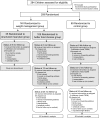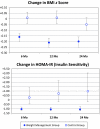Long-term results of an obesity program in an ethnically diverse pediatric population
- PMID: 21300674
- PMCID: PMC3065145
- DOI: 10.1542/peds.2010-0697
Long-term results of an obesity program in an ethnically diverse pediatric population
Abstract
Objective: To determine if beneficial effects of a weight-management program could be sustained for up to 24 months in a randomized trial in an ethnically diverse obese population.
Patients and methods: There were 209 obese children (BMI > 95th percentile), ages 8 to 16 of mixed ethnic backgrounds randomly assigned to the intensive lifestyle intervention or clinic control group. The control group received counseling every 6 months, and the intervention group received a family-based program, which included exercise, nutrition, and behavior modification. Lifestyle intervention sessions occurred twice weekly for the first 6 months, then twice monthly for the second 6 months; for the last 12 months there was no active intervention. There were 174 children who completed the 12 months of the randomized trial. Follow-up data were available for 76 of these children at 24 months. There were no statistical differences in dropout rates among ethnic groups or in any other aspects.
Results: Treatment effect was sustained at 24 months in the intervention versus control group for BMI z score (-0.16 [95% confidence interval: -0.23 to -0.09]), BMI (-2.8 kg/m(2) [95% confidence interval: -4.0-1.6 kg/m(2)]), percent body fat (-4.2% [95% confidence interval: -6.4% to -2.0%]), total body fat mass (-5.8 kg [95% confidence interval: -9.1 kg to -2.6 kg]), total cholesterol (-13.0 mg/dL [95% confidence interval: -21.7 mg/dL to -4.2 mg/dL]), low-density lipoprotein cholesterol (-10.4 mg/dL [95% confidence interval: -18.3 mg/dL to -2.4 mg/dL]), and homeostasis model assessment of insulin resistance (-2.05 [95% confidence interval: -2.48 to -1.75]).
Conclusions: This study, unprecedented because of the high degree of obesity and ethnically diverse backgrounds of children, reveals that benefits of an intensive lifestyle program can be sustained 12 months after completing the active intervention phase.
Figures


Comment in
-
Sustained reduction in body mass index and other cardiovascular risk markers a year after a 12-month intensive family-based lifestyle intervention for obese children; but follow-up of participants low.Evid Based Med. 2011 Dec;16(6):185-6. doi: 10.1136/ebm-2011-0037. Epub 2011 Aug 23. Evid Based Med. 2011. PMID: 21865233 No abstract available.
References
-
- Summerbell CD, Ashton V, Campbell KJ, Edmunds L, Kelly S, Waters E. Interventions for treating obesity in children. Cochrane Database Syst Rev. 2003;(3):CD001872. - PubMed
-
- Savoye M, Berry D, Dziura J, et al. Anthropometric and psychosocial changes in obese adolescents enrolled in a Weight Management Program. J Am Diet Assoc. 2005;105(3):364–370 - PubMed
-
- Savoye M, Shaw M, Dziura J, et al. Effects of a weight management program on body composition and metabolic parameters in overweight children: a randomized controlled trial. JAMA. 2007;297(24):2697–2704 - PubMed
-
- Whitlock EP, O'Connor EA, Williams SB, Beil TL, Lutz KW. Effectiveness of weight management interventions in children: a targeted systematic review for the USPSTF. Pediatrics. 2010;125(2). Available at: www.pediatrics.org/cgi/content/full/125/2/e396 - PubMed

